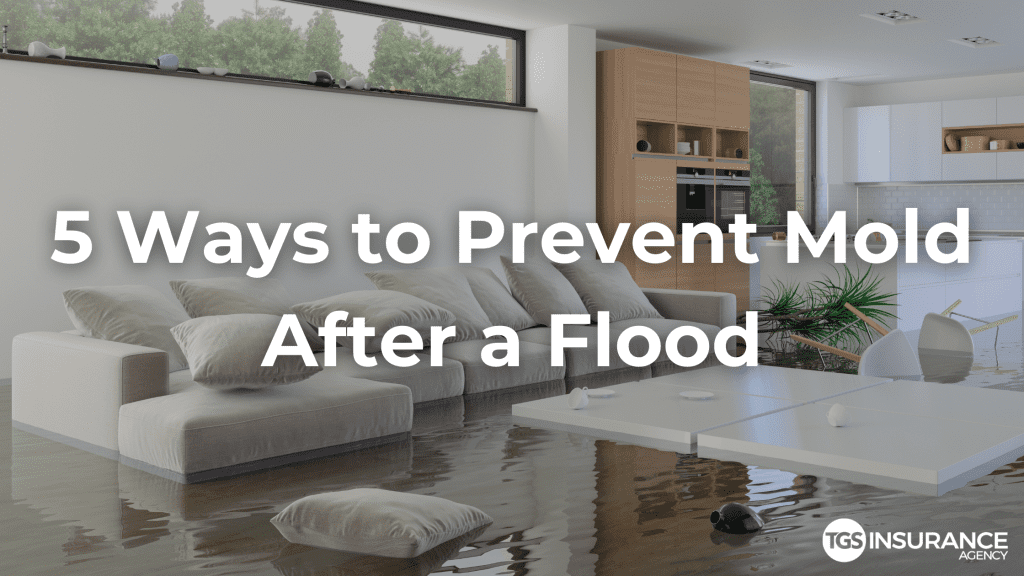
Unattended water can lead to mold damage in your home and cause various health-related issues such as asthma, lung irritation, and allergies. Mold thrives in humid, rainy conditions and can easily spread after the water evaporates in the air. Learning how to prevent mold after water damage is not only good for your home, it’s imperative for your health.
If you do experience a flood or a burst pipe, for example, it’s ideal for working with a water damage restoration company to help professionally dry out your home and prevent the mold from spreading. But there are preventive measures you can take to lessen the chance of mold spreading in your home. Here are five ways to mitigate mold damage.
1. Clean and Dry the Flooded Areas As Soon As Possible
The longer the water sits, the harder the repair will be, so time is really of the essence when it comes to water damage. Start cleaning as soon as possible or within 48 hours of a flood, but only if you can safely get to your home.
Once you return home, inspect every room and see if there are any signs of water, leaks, or spills. After determining which rooms have water damage, start drying out the areas with a wet and dry vacuum cleaner. You can rent one from stores like Home Depot and Best Buy. If the water damage is in a big area, such as your living room or basement, you can hire a mold removal company to help with the workload.
If the water damage is in a room with carpet or rugs, dry them using the vacuum cleaner, and then to completely dry, put a fan on the area for 24 hours or more. After drying, you can steam-clean your carpet to give it extra freshness.
2. Inspect Your Home’s Exterior
Do a walk around the perimeter of your home to see if there are puddles or poolings of water near your home’s foundation that could cause cracks and other damage like mold growth. If you notice pooling water, you may need to extend your downspouts or add a French drain to guide water away from your home’s foundation.
3. Dehumidify Your Home
After a flood, moisture in the air can cause mold growth, and that is why it’s so important to get your house as dry as possible. Here are some ways you can dehumidify your home:
- Use a dehumidifier to keep the air dry and pure
- Turn on every fan in your home
- Open windows throughout your home
It’s also a good idea to measure the humidity levels inside your home using a humidity monitor. According to the United States Consumer Product Safety Commission, the ideal level is 30-50 percent for homes.
4. Salvage Furniture
Determine what furniture can be salvageable from what cannot be saved. Upholstered furniture that has been soaking in water for too long may be hard or even impossible to restore. Similarly, wood furniture could become warped, and you may struggle to save it. Consider the cost of the item in relation to the cost of having it repaired or restored. It may be worth filing an insurance claim and reimbursed for replacement furniture.
If you decide to keep some of your furniture, we recommend only having it cleaned by a professional. The process can be fairly expensive because cleaning may consist of stripping the furniture down to its frame. Even the springs and webbing might need to be replaced, depending on the extent of the water damage. That is why we recommend just filing a claim to get compensated for new furniture.
5. Throw Away What Can’t Be Cleaned
Not everything can be thoroughly cleaned and dried. Items like electronics may be too far gone for repairs and must be thrown out. Before getting rid of these items, ensure they are accounted for in your insurance claim. Your claims adjuster will need documentation of your losses to approve your claim, so be sure to take videos and pictures before you throw it away.
How TGS Insurance Can Help With Water Damage
Water damage can be inconvenient, disgusting, and, worst of all, expensive. Your homeowners insurance policy doesn’t provide coverage for flood damage or leaks due to poor maintenance, so you might want to consider purchasing a flood insurance policy or a water damage add-on to ensure you’re protected from all types of water damage.
At TGS Insurance, our agents specialize in finding each of our clients’ great coverage for the lowest rate! From our pool of over 35 best-in-class insurance providers, we will find you a flood policy customized to your needs and budget. Our agents provide an exceptional customer service experience and will be with you every step of the way. Buying insurance is so simple with TGS Insurance!